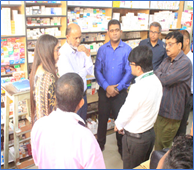What are Model Medicine Shops?
Before MSH’s BHB project, which was launched in 2018, there were no standards set by the DGDA for licensed retail medicine shops to store and sell medicines. With BHB facilitation, DGDA developed and enforced a standard guideline for this purpose. The accreditation process involved several steps: assessing the medicine shops, training the dispensers, and conducting follow-up and in-person inspections by district DGDA officials to ensure standards were met. Medicine shops that qualified were awarded accreditation certificates by the DGDA, designating them as Model Medicine Shops or Model Pharmacies based on their grading. Once accredited, these shops could display the government logo to enhance visibility for customers and partners.
Expected Good Practices by a Model Medicine Shop or a Model Pharmacy
- Does not sell antibiotics without a valid prescription.
- Maintains a register of antibiotics dispensed.
- Identifies and safely disposes of expired medicines.
- Stores temperature-sensitive medicines in appropriate and functioning refrigerators.
- Provides counselling to clients while dispensing medicines.
- Packs medicines with dosing and timing labels while selling.
- Keeps all suppliers’ invoices for at least two years.
| Achievements 2018-2024 | ||
| Indicator | Target | Achieved |
| No. of medicine shops pre-assessed | 23,000 | 23,093 |
| No. of medicine dispensers trained on GPP | 14,000 | 14,129 |
| No. of medicine shops accredited | 10,000 | 10,345 |
Sustainability of the MMS and MP program
The DGDA kept provision in its Operation Plan 2024-2029 to continue and sustain the MMS and MP program.





